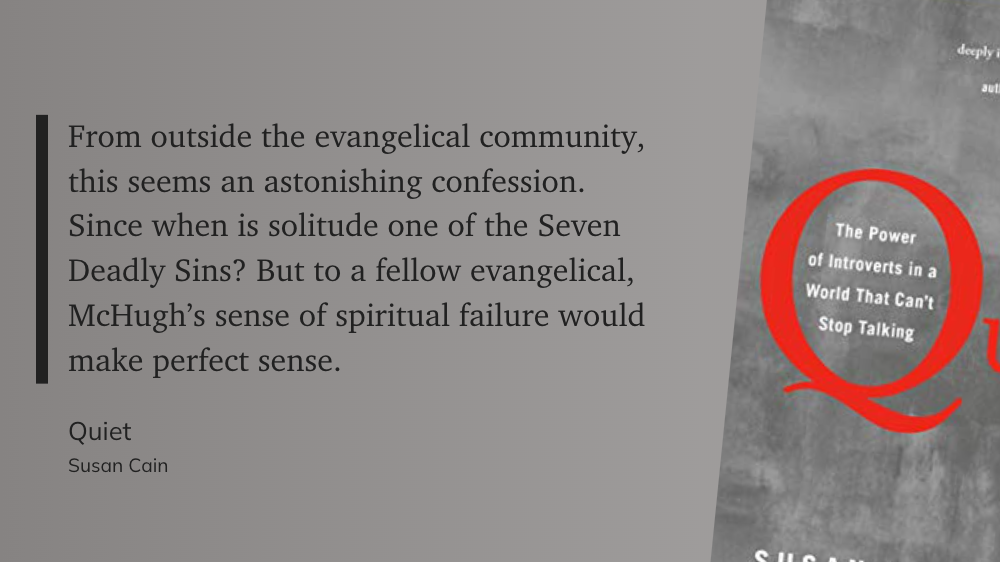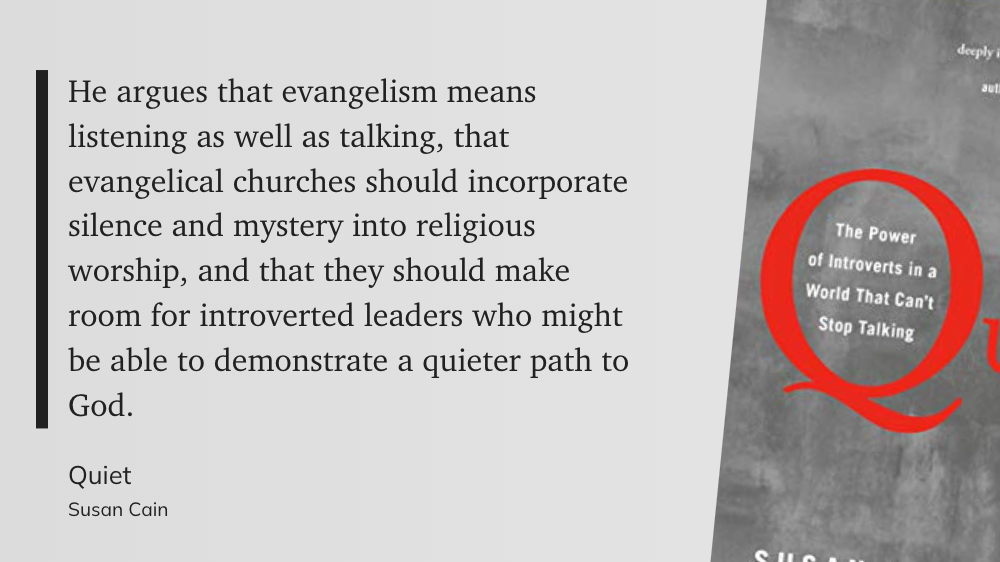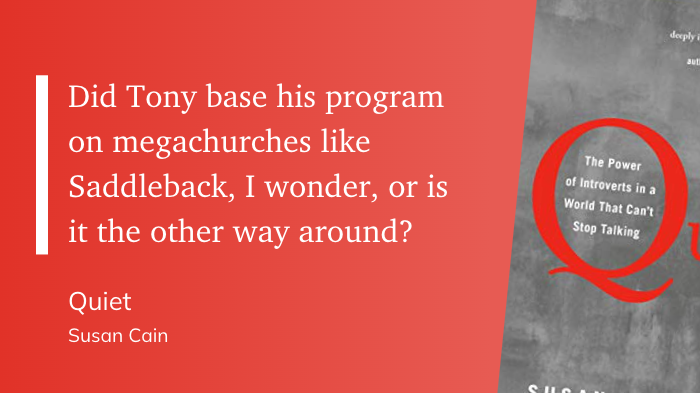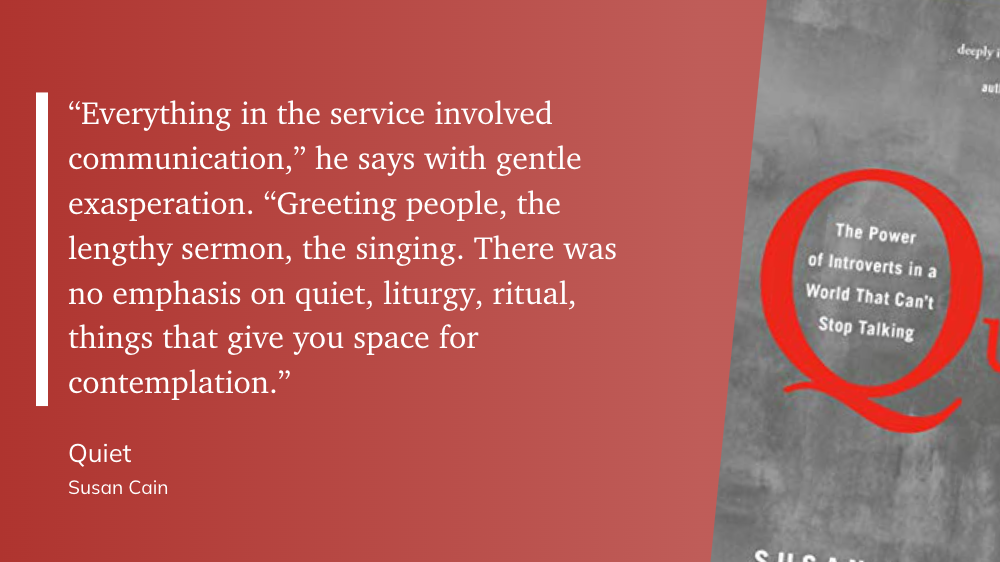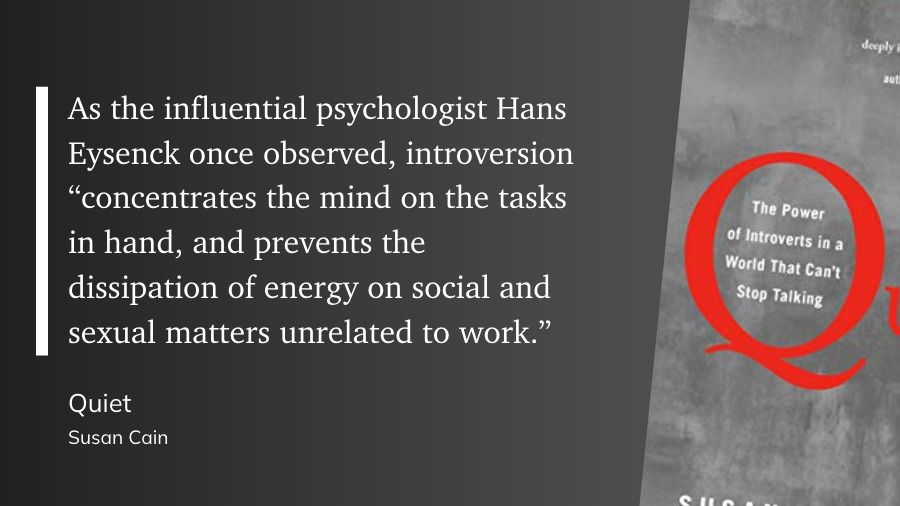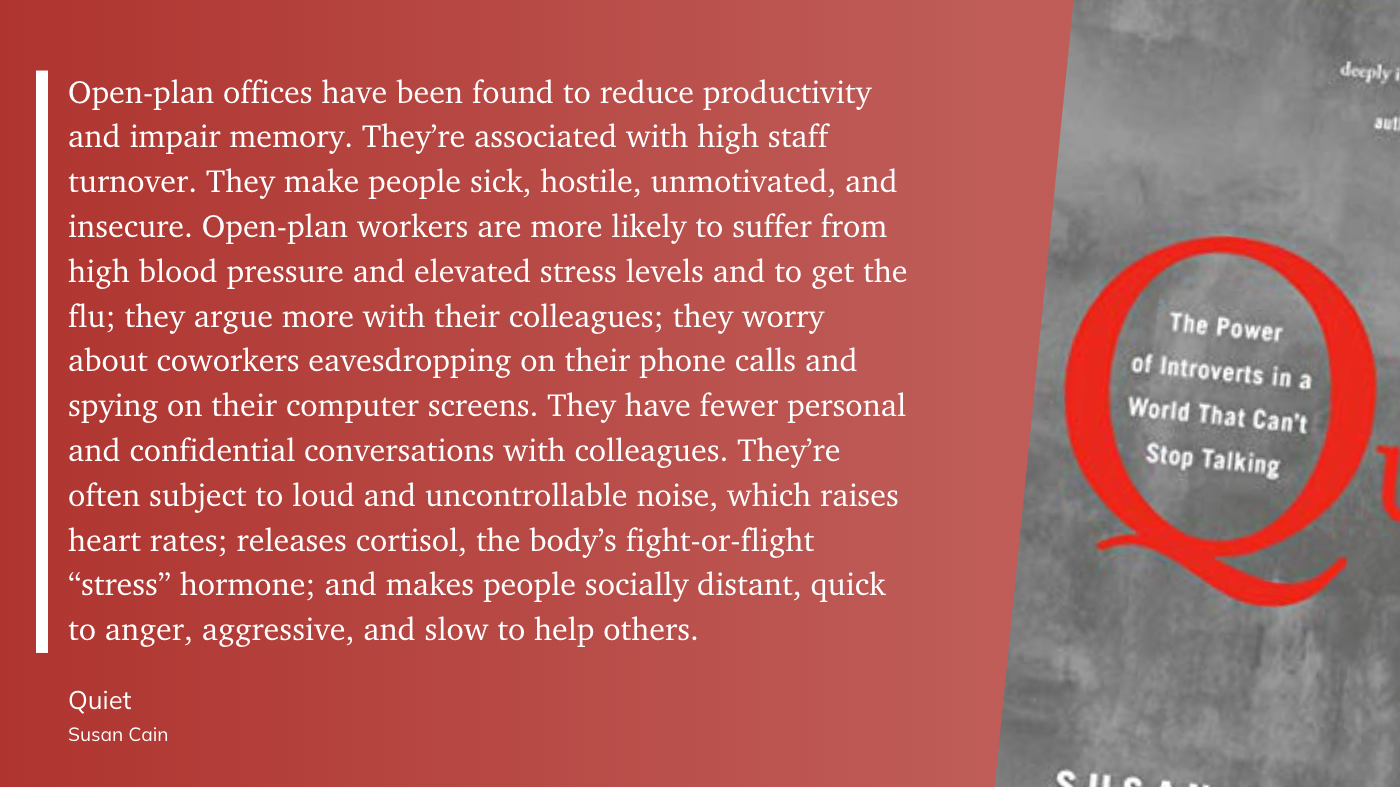My second week in Maneetpaul's Book Club, reading Quiet by Susan Cain, reading chapters two and three The Myth of Charismatic Leadership and When Collaboration Kills Creativity.

The previous week of this book club
Chapter Two: The Myth of Charismatic Leadership
Tony Robbins
I had heard of Tony Robbins, but I never knew much about him. I had an old boss who was really into him (or so the rumour went, at least), and I just put him into the category of 'motivational speaker'. Now, after having read Cain's take on his seminars, I don't think that quite covers it. It reminds me of what I've read about Robert Kiyosaki's classes (the guy who wrote Rich Dad, Poor Dad). It's not an environment where I could ever be comfortable.
Later, Cain compares Tony Robbins' seminars with the way megachurches run their services. I agree, there is a connection, and I've had my own issues and concerns about how megachurches operate, but there is one big difference for me: I believe in what the megachurches are worshiping (even if I can't always get on board with the way they do it and some of the details). So I guess that's how it works, if you're a true believer, you can get into it. It's like a rock concert, if you love the artist, you're prepared to be so excited and to sing and dance and almost become part of the show.
At one point, Cain talks about how the evangelical Christian community has shunned the practice of silence and solitude. And in my experience this is true in some circles, though I don't think you can label the whole community like this. Coincidentally, at the moment, my church is currently doing a series over four months on silence and solitude. It's one of the keys to a faithful Christian life, I believe. I had forgotten what it was like to be part of a church where this was looked down upon and I'm so thankful I no longer am.
Harvard Business School
I found myself reacting differently to different aspects of the HBS environment: I wish I'd had a chance to be in an academic environment where sharing my own thoughts and opinions and strongly debating them with others was encouraged, that would've been great fun and I think I would've been good at it; but, on the other hand, I'd prefer to leave that in the classroom and not be forced to socialise at lunch or in the evenings with classmates where drinking and boisterous behaviour were the norm.
I started to wonder if I was intellectually extroverted, but socially introverted. Give me a debate in front of an audience (on a topic I actually know something about and have had time to prepare for) and I'll be there; take me on a pub crawl and, no, I'd rather not, but if I do go, I'll create my own smaller group within the larger group that I hang out with all night.
“I worry that there are people who are put in positions of authority because they’re good talkers, but they don’t have good ideas,” he said. “It’s so easy to confuse schmoozing ability with talent. Someone seems like a good presenter, easy to get along with, and those traits are rewarded. Well, why is that? They’re valuable traits, but we put too much of a premium on presenting and not enough on substance and critical thinking.”
One thread that you can see in these two chapters is the difference between content and delivery carrying the day. You can win an argument by powerful rhetoric, or you can convince someone of your perspective, but more powerful than this is the exchange of thoughts, ideas, and experiences. I have no idea what HBS was like, or which of these was most prominent, I'm much more interested in being part of an exchange where people really try to understand each other instead of just win a debate, so I ended up not very sure what kind of experience I would have in such classrooms.
Is Introversion Selfish?
One theme that I'll probably come back to – and I'm starting to be convinced is more nuanced than I'd thought – is how, in certain group dynamics, the way that introverts are described in this book comes across to me as selfish. My thinking is not fully formed, but goes along the following lines:
- If you only share what you've been thinking when you've finished thinking, are you saying that you're smart and knowledgeable enough to come up with the right answers on your own?
- If you are sitting back in a group discussion instead of sharing, are you saying that you're not willing to help the other people in the group?
I think the answer will have to be that, no, introverts who don't contribute much in groups aren't being selfish. They can and will contribute but, like everyone, they need to be given the opportunity to do their best work without having to do so in a stressful environment.
'If someone doesn't speak by the end of the semester, it's problematic,' Professor Michel Anteby told me. 'It means I didn't do a good job.'
This quote from one of the professors at Harvard Business School struck me as something I would say. I run a lot of meetings at work and I deal with a lot of introverts, some of whom tend to over-function in meetings (this is where I fit in) and some tend to under-function. If I'm running a meeting, I view it as my job to make sure that these under-functioning introverts are given the opportunity to have their voices heard. I'm only beginning to understand now that this must involve more than just giving them space, they also need time and the right opportunities, e.g., preparing something in advance or 'offline' (outside of the meeting) to share with the group.
As Always, Why Not Both?
We sometimes pit introverts and extroverts against each other, but despite what is said in the third chapter about the downsides to collaboration, introverts and extroverts can complement each other.
One of the examples given was about a comparison of stores managed by introverts vs those managed by extroverts. Extroverted leaders succeeded when they had passive (note, not labelled as introverts) employees while introverted leaders succeeded when they had active (note, not labelled extroverts) employees. What I drew from this was that we need extroverts (to manage the passives) and we need introverts (to manage the actives).
Examples given in this book about great pairings of extroverts and introverts: Moses and Aaron, Steve Wozniak and Steve Jobs. This is a pattern I've seen played out in places I've worked and the marriages of my friends – an introvert and an extrovert and can make a pretty powerful combo.
Survivorship Bias
Survivorship bias is the tendency to focus on the individuals or things that made it past a selection process, while overlooking those that did not, leading to a skewed perception of success or failure. (Generated by GPT 3.5 Turbo.)
This is one of my pet peeves and it's present in so much popular non-fiction work: if you look only at successful companies or individuals, you might think you've found the keys to their success, but you are just as likely to have simply found things that are present in both successful and unsuccessful companies/individuals.
There are numerous examples of this throughout Quiet, and one was from Jim Collins' book Good to Great:
When he started his research, all he wanted to know was what characteristics made a company outperform its competition. He selected eleven standout companies to research in depth.
I plan to read Good to Great, it's probably a quality read with a lot of good insights, but you won't convince me of much if you've just looked at a range of successful individuals.
Chapter 3: When Collaboration Kills Creativity
A Shift in Perspective
This chapter goes into depth about how collaboration and creativity are not as closely linked as we might have thought. This chapter challenged a lot of my preconceptions about how we can get the best work. Cain is not saying that collaboration is not effective, but that it is not the secret to success that many think it is. When I started reading, I had issues with a lot of what was said, but I ultimately found it quite persuasive and enjoyed seeing my perspective shift over the course of reading it.
The Hell That Is an Open Plan
Cain talks a lot about how open-plan offices have not boosted productivity and creativity, but have instead diminished it, and I believe it. I have always loved and wanted my own office. Somewhere where I had permission to close the door. Somewhere I could go to work and to think. I love working from home for this very reason. But, I still feel a need to collaborate.
When Loneliness Prompts Innovation
He would never have learned so much about computers, Woz says now, if he hadn’t been too shy to leave the house.
I resonate with this. I haven’t done anything remarkable with my life, but what little I have achieved, I believe that it is at least partly because I wasn’t distracted by the normal socialising that took up so much time. Not by my own choice.
The Failure of Brainstorming
One of the more shocking results that Cain shared in this chapter was about one of my cherished tools: the brainstorm. She made powerful arguments that brainstorming doesn't actually work, and included some research that showed more ideas actually come from letting people work individually instead of brainstorming as a group.
In real life (i.e., physically meeting with people), the larger the group the worse the quality of the results. However, online, the larger the group the better the results.
Having said this, the one argument I've still got for in-person (or over live video chat) brainstorming sessions is that you can actually get people to do it. When it comes to voluntary organisations where you can’t force people to prepare in their own time or even workplaces where not doing a particular task could go unnoticed, if you run a group brainstorming session, you have people’s attention and they actually participate. I haven’t found a way to get people to participate, even at work, reliably, without actually having a meeting.
The way forward, I’m suggesting, is not to stop collaborating face-to-face, but to refine the way we do it.
The most effective teams are composed of a healthy mix of introverts and extroverts, studies show, and so are many leadership structures.
We also need to create settings in which people are free … to disappear into their private workspaces when they want to focus or simply be alone.
My Experiences with Collaboration
The question from my book club this week is: 'What are your thoughts on working in groups versus working in solitude? Do you have a preference for one or the other?'
I'd say I'm about 70/30. If I get no feedback or collaboration, I tend to feel stifled and alone - depending on the project. If I get no time alone, then I tend not to make much progress. I prefer periods of working alone and then sharing with the group. I don't usually have the (what I view as potentially arrogant) assumption that I could come up with the right answer alone and need nothing from others.
There aren't many things of value that I've done that I could do entirely without the help of others. When I do collaborate, I prefer to do it alongside others that I know and trust, people who are smart and interested in helping me along. I think of C. S. Lewis, J. R. R. Tolkien, and others, in the Inklings group. For a group like that to work, I think it would need to be small enough for everyone to contribute and for the group members would need to know each other really well (or take the time to get to know each other), to share interests, and to be equally committed to creating something to share with the group.
This makes me think there might be a perfect combination of the two options: do your work alone, then come back to the group to present it, have it critiqued and enjoyed, and to enjoy the work of others.
Favourite Quotes

